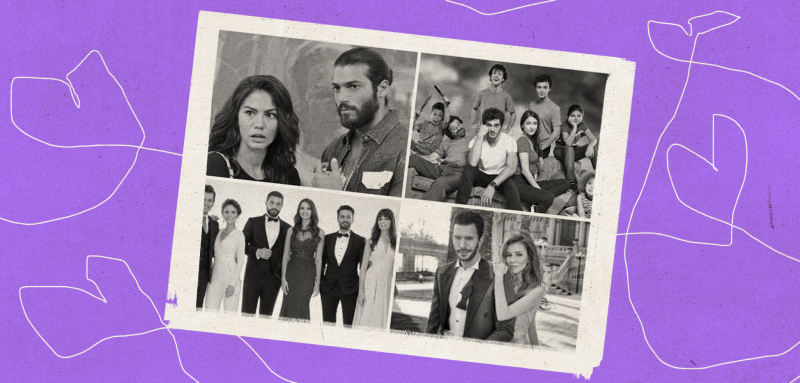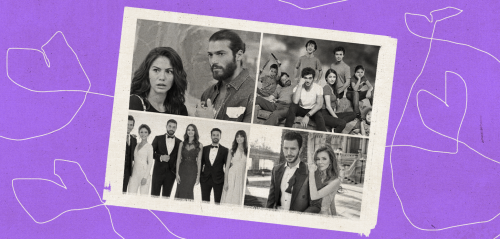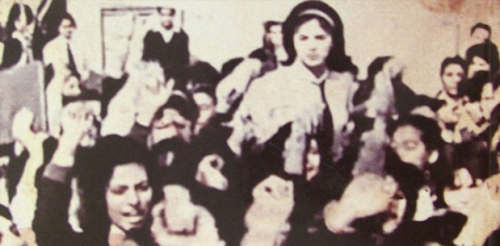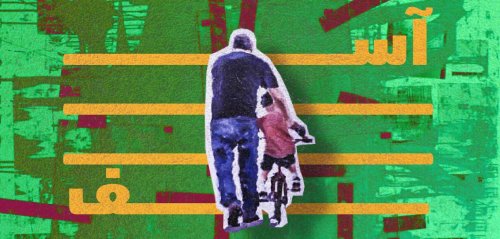In 2005, Syrian-dubbed Turkish shows found their way into our small house in our remote rural village. My mother became quite attached to them and started watching them with great interest, which surprised and piqued my curiosity.
That simple rural woman, who never stopped moving – she always had something to do – had been content for many years with watching the 7:15 PM show on Channel 2 of Egyptian TV with interest and passion, especially if it was written by the brilliant Osama Anwar Okasha. She would be affected by its story and would empathize with its characters all the more.
But she would always watch the episodes while doing something else: knitting new clothes, mending old ones, making a pillow from scraps of worn-out fabrics, feeding a newborn chick herself, or lighting the stove to toast simple bread loaves for dinner. I cannot recall a single moment when she abandoned her tasks, even while watching her favorite series.
However, things changed with "The Years of Loss" (Ihlamurlar Altında) or the series she used to call by the names of its protagonists, "Yahya and Lamis". I still remember her mesmerized face as she watched on the television screen the love story of the beautiful girl and the heroic man with every part of her soul, as they say. She would sigh from time to time, and nibble on her lips while placing her hand on her cheek at other times. Her eyes would shine whenever she followed their eyes silently exchanging love, and she would smile shyly whenever they exchanged passionate kisses.
I would observe her facial expressions with a smile that I couldn't hide, and I would wonder, "What attracts a woman nearing her sixties to this teenage stuff?"
I jokingly ask her, "What do you like about these people, Mama?"
She laughs shyly and simply says, "They know how to love, my girl."
I smile in astonishment! My mother, the reserved and shy woman who I never heard speak about love or sex, even in a joke like other women in our village do, uttered such a sentence, just like that. Despite her age, she still carries a heart that trembles with love, melts with longing, and yearns for a long embrace from someone she loves.
I would wonder, "What attracts a woman nearing her sixties to this teenage stuff?" I jokingly ask her, "What do you like about these people, Mama?" She laughs shyly and simply says, "They know how to love, my girl.
I'm amazed as I discover another side of my mother, who once scolded my classmate in the second grade when he dared to knock on our door one afternoon, asking about me after I was absent from school. She told him sternly not to do it again, then surprised me with a pinch on my earlobe, a move that every Egyptian mother masters, while furrowing her brow and saying, "I do not have a daughter who knows boys. You understand?"
That day, I memorized the lesson well and never forgot it. Whenever a classmate would approach me throughout my years of education, I would remember the pain of that first pinch, and my face would scrunch up, to the point where my friends gave me the nickname "al-Brawiya" (the glower).
I became afraid to confide in her if my feelings had involuntarily stirred toward someone, or if a teenage love played in my imagination, or even if a passerby harassed me. She knew everything. That's what I believed and convinced myself of: My mother knows everything, so there's no need to talk about it.
I knew that despite her external toughness, she had a tender heart. The woman who melts with passion in the songs of Fairouz, Najat, and Fayza Ahmed, and has memorized the poems of Nizar Qabbani, El Hadi Adam, and Kamel El-Shenawy by heart, can never be emotionally dry.
I learned from my aunt once that my mother had fought a battle with my grandfather to marry my father. He saw him as unsuitable, but she had fallen in the trap of love and refused to give up her right to choose. Their love story was exemplary, which surprised me. Since I became aware of my surroundings, I saw them as different, distant. I don't remember ever seeing them embrace, hold hands with love, or exchange even innocent, fleeting kisses. They had separate rooms and beds. Where did the love go? When and how did its flames go out?
These are questions I never dared to ask her, but I read her answer in her eyes as she followed the love story of "Yahya and Lamis", with all the looks, whispers, touches, and burning desires that never ceased their fire. Surely, her connection with the characters of "The Years of Loss" compensated for what she had lost in the years of her life that slipped away against her will.
Different generations of women are searching for love scenes that satisfy their emotional starvation and suppressed desires. I asked online: "What is it about Turkish dramas that captivates you this much?" They all responded the same: "They know how to love"
My mother's emotional deprivation, for which I never knew the reason, made me hesitate a lot in making the decision to get married, for fear of repeating her experience. But in the end, I fell into the forbidden and married a man who loved me and whom I loved. Yet, I decided not to become a replica of my mother in my marriage.
I made peace and reconciled with my body and loved it. I realized that it was my right to express my feelings and desires, to express my love, anger, and needs. I decided to be a strong woman who asks when she wants and refuses when desire fades. I decided that touch, kiss, and embrace would become daily expressions of my life, not just scenes I watch on TV.
But the years pass, and everything becomes repetitive and mundane, even love. Despite my rejection of routine and my attempts to escape it with all the means God has given me, life's mill keeps grinding us and robbing us of passion. Familiarity becomes an essential partner against our will. Despite physical satisfaction, spiritual contentment, and emotional security, over time, I began to long for past feelings. I feel hungry for them. The innocence of beginnings, the beauty of hints, and the perplexity of disclosure. The anticipation that follows absence. A fleeting coincidence that makes the heart tremble. An innocent touch that ignites the fire of longing for a long embrace. A whisper in the crowd that my radar catches or a glance that I decipher alone. Arguments, stubbornness, and distance. All these are details that have been buried behind marriage, but their specter still haunts me from time to time.
If my mother became addicted to watching Turkish shows to compensate for the emotional deprivation she experienced as a wife, I took refuge in these tv series out of longing for the deprivation I experienced before marriage. Each has their reasons
I tried to tell my husband that I missed and longed for the intensity of beginnings, but he responded with a laugh, saying, "We've passed that stage a long time ago, my dear." I fell silent and found no energy within me to explain or justify. I succumbed to boredom, and the days passed one after another.
Until I came across a question someone had asked on Facebook, "I want a new Turkish series that will pull me in and get me out of this state of emotional coldness I'm experiencing these days."
The question took me back to years long gone, and my inner self responded with surprise, "Are there still people watching Turkish shows?"
It seems that the passage of years hasn't taken the Turkish dramas away from the Egyptian audience. Here we have new generations of women searching for love scenes that satisfy their emotional starvation and ignite their suppressed and pent-up desires.
I followed the answers to the question with a smile, recalling my mother's attachment to characters like Yehia and Lamis, Asmar and Assi, Samar and Mohannad, and others. I discovered that my mother was not the only one who found solace in Turkish dramas, replacing all that she had lost in terms of emotions. Many others shared the same sentiment, so I asked them a question: "What is it about Turkish dramas that captivates you to this extent?"
And my mother's response was present, albeit with different wording from one woman to another: "They know how to love."
"It is evident that emotional starvation gnaws at the hearts of Egyptian women," I whispered to myself as I read the women's responses to my question. Each one competed in describing the beauty of her favorite Turkish series, an explanation that led Facebook to recommend some clips from the latest Turkish TV shows. That's when a glance from one of the clips caught my attention, confusing me as it reminded me of the emotions I long for. I exclaimed, "This is the look that I miss so much!" Then I eagerly searched for episodes of the series "Zahrat Al-Dam" (Blood Flower) and followed the impossible love story between its protagonists, Baran and Dilan, suddenly finding myself ensnared and driven to watch it compulsively.
I eagerly awaited each new episode like a teenager, despite it being a repetitive, traditional story with no originality or creativity, or a extraordinary, distinctive direction. The episodes were filled with flashbacks as a conventional means of prolonging the plot, accompanied by naive mistakes and forced performances from some of the actors. Yet, despite all of that, it was filled with vocabulary that I yearned to experience with my own senses, as well as longing, hesitation, and the desire to confess and express oneself. It contained that confusion when one is trying to interpret the overwhelming emotions that seize the heart, the yearning for a kiss, and the longing for an embrace, especially since the protagonists were trapped, their desires suppressed and their passionate feelings held tightly in an iron grip, imposing an emotional deprivation on them that provoked me and made me yearn for the long days of deprivation I experienced when my emotions were aflame with passion. Days in which I explored love, madness, and dreams. Days when I was a wild, rebellious spirit that knew no limits and did not recognize barriers. A spirit whose desires were tied down by a body that sought to satisfy its own desires, causing the spirit to lose its freedom and transform, over time, into a version of my mother. If my mother, may she rest in peace, became addicted to watching Turkish shows to compensate for the emotional deprivation she experienced as a wife, then I took refuge in these tv series out of longing for the deprivation I had experienced before marriage. Each of us has our reasons.
* The views and opinions expressed in this article are those of the author’s and do not necessarily reflect the official policy or position of Raseef22
Raseef22 is a not for profit entity. Our focus is on quality journalism. Every contribution to the NasRaseef membership goes directly towards journalism production. We stand independent, not accepting corporate sponsorships, sponsored content or political funding.
Support our mission to keep Raseef22 available to all readers by clicking here!
Interested in writing with us? Check our pitch process here!











